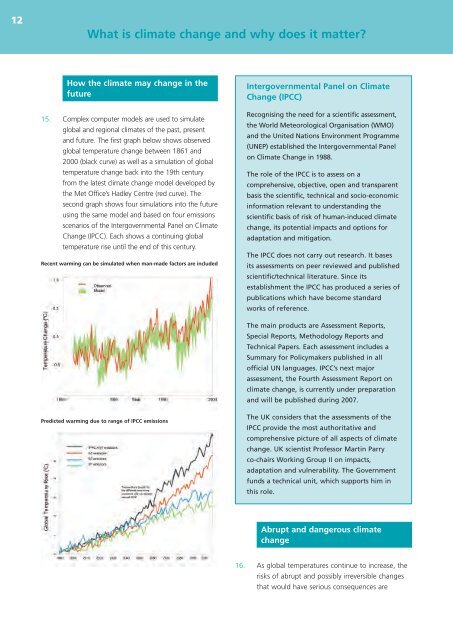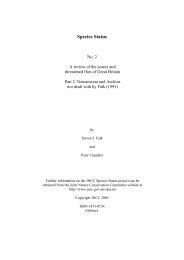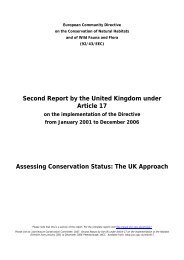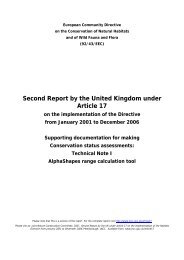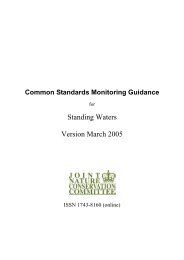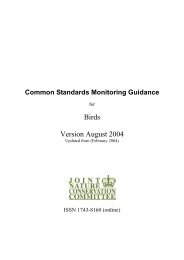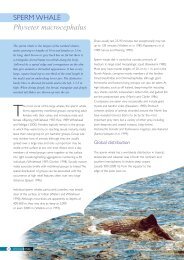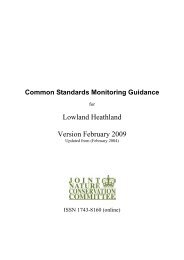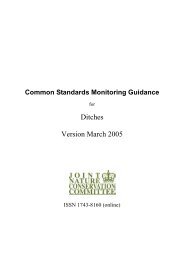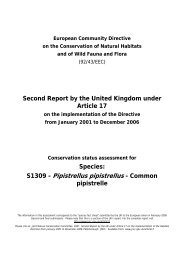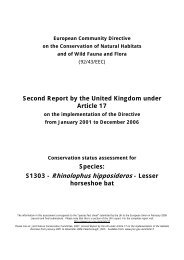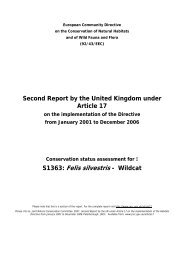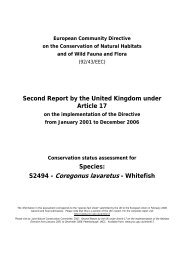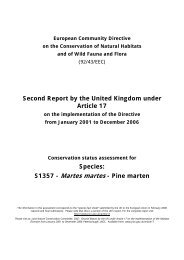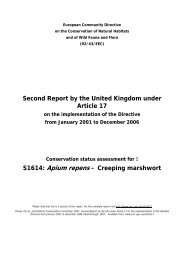UK Climate Change Programme 2006 - JNCC - Defra
UK Climate Change Programme 2006 - JNCC - Defra
UK Climate Change Programme 2006 - JNCC - Defra
Create successful ePaper yourself
Turn your PDF publications into a flip-book with our unique Google optimized e-Paper software.
12<br />
What is climate change and why does it matter?<br />
How the climate may change in the<br />
future<br />
15. Complex computer models are used to simulate<br />
global and regional climates of the past, present<br />
and future. The first graph below shows observed<br />
global temperature change between 1861 and<br />
2000 (black curve) as well as a simulation of global<br />
temperature change back into the 19th century<br />
from the latest climate change model developed by<br />
the Met Office’s Hadley Centre (red curve). The<br />
second graph shows four simulations into the future<br />
using the same model and based on four emissions<br />
scenarios of the Intergovernmental Panel on <strong>Climate</strong><br />
<strong>Change</strong> (IPCC). Each shows a continuing global<br />
temperature rise until the end of this century.<br />
Recent warming can be simulated when man-made factors are included<br />
Intergovernmental Panel on <strong>Climate</strong><br />
<strong>Change</strong> (IPCC)<br />
Recognising the need for a scientific assessment,<br />
the World Meteorological Organisation (WMO)<br />
and the United Nations Environment <strong>Programme</strong><br />
(UNEP) established the Intergovernmental Panel<br />
on <strong>Climate</strong> <strong>Change</strong> in 1988.<br />
The role of the IPCC is to assess on a<br />
comprehensive, objective, open and transparent<br />
basis the scientific, technical and socio-economic<br />
information relevant to understanding the<br />
scientific basis of risk of human-induced climate<br />
change, its potential impacts and options for<br />
adaptation and mitigation.<br />
The IPCC does not carry out research. It bases<br />
its assessments on peer reviewed and published<br />
scientific/technical literature. Since its<br />
establishment the IPCC has produced a series of<br />
publications which have become standard<br />
works of reference.<br />
The main products are Assessment Reports,<br />
Special Reports, Methodology Reports and<br />
Technical Papers. Each assessment includes a<br />
Summary for Policymakers published in all<br />
official UN languages. IPCC’s next major<br />
assessment, the Fourth Assessment Report on<br />
climate change, is currently under preparation<br />
and will be published during 2007.<br />
Predicted warming due to range of IPCC emissions<br />
The <strong>UK</strong> considers that the assessments of the<br />
IPCC provide the most authoritative and<br />
comprehensive picture of all aspects of climate<br />
change. <strong>UK</strong> scientist Professor Martin Parry<br />
co-chairs Working Group II on impacts,<br />
adaptation and vulnerability. The Government<br />
funds a technical unit, which supports him in<br />
this role.<br />
Abrupt and dangerous climate<br />
change<br />
16. As global temperatures continue to increase, the<br />
risks of abrupt and possibly irreversible changes<br />
that would have serious consequences are


